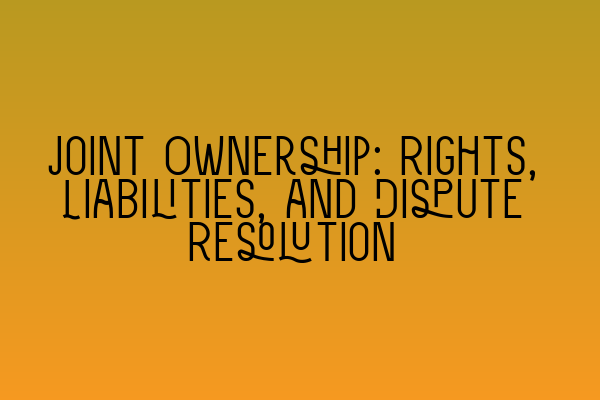Joint Ownership: Rights, Liabilities, and Dispute Resolution
Joint ownership of property can be a complex and intricate legal arrangement. Whether you are considering purchasing a property with someone else or already own property jointly, it is important to understand your rights, liabilities, and methods of dispute resolution. This article will provide an overview of joint ownership and its nuances.
Before delving into the specifics, it is essential to understand the different forms of joint ownership. There are two main types: joint tenancy and tenancy in common. In joint tenancy, co-owners have an equal and undivided interest in the property, with the right of survivorship. This means that if one co-owner passes away, their share automatically transfers to the surviving co-owner(s). In tenancy in common, each co-owner has a specific share of the property, which they can pass on to their heirs upon death.
Rights of Co-owners
Understanding your rights as a co-owner is crucial for a harmonious arrangement. In joint tenancy, each co-owner has an equal right to use and possess the entire property. This means that decisions regarding the property must be made jointly, including the sale or transfer of ownership. In tenancy in common, co-owners have the right to use and possess the property according to their percentage share. However, they can also agree to use the property in a different manner through a legally binding agreement.
Liabilities of Co-owners
Joint ownership comes with various liabilities that co-owners must be aware of. In joint tenancy, each co-owner is jointly and severally liable for all debts attached to the property. This means that if one co-owner defaults on their financial obligations, the others are responsible for covering the remaining debt. In tenancy in common, co-owners are only liable for their respective share of the property’s debts. It is crucial to clarify financial responsibilities and obligations through a legally binding agreement to avoid potential disputes.
Dispute Resolution
Despite the best intentions and careful planning, disputes can arise between co-owners. It is advisable to resolve conflicts amicably through negotiation and mediation. Mediation involves the assistance of an impartial third party who helps facilitate communication and reach a mutually satisfactory agreement. If mediation fails, legal action may be necessary.
When facing a dispute, it is crucial to consult a qualified solicitor specializing in property law. A solicitor can provide expert advice on the best course of action and guide you through the legal process. They will assess your situation, review any relevant documentation or agreements, and provide a range of options to resolve the dispute effectively.
Conclusion
Joint ownership of property carries rights, liabilities, and the potential for disputes. Understanding your rights as a co-owner, clarifying financial obligations, and having a method of dispute resolution in place are essential for a successful joint ownership arrangement. Consultation with a specialist solicitor is recommended to ensure your interests are protected.
For more information on related topics, please visit the following articles:
